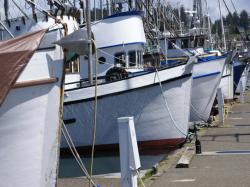New England Fishing Groups Oppose Use Of Antiquities Act For Atlantic Marine Monument
August 5, 2016 | 3 min to read

WASHINGTON (NCFC) – Led by Sen. Richard Blumenthal, the Connecticut Congressional Delegation today asked President Obama to use executive authority under the Antiquities Act to designate the New England Coral Canyons and Seamounts as a Marine National Monument. The Connecticut Congressional Delegation is comprised of Sen. Blumenthal, Sen. Chris Murphy, Rep. John Larson, Rep. Joe Courtney, Rep. Rosa DeLauro, Rep. Jim Himes, and Rep. Elizabeth Esty.
Members of the National Coalition for Fishing Communities (NCFC) have previously expressed opposition to the misuse of the Antiquities Act to designate an Atlantic Marine Monument. A monument designation would subvert the open and transparent process for fisheries management currently in place under the Magnuson-Stevens Act, and threatens the jobs and livelihoods of hardworking fishermen.
Below are statements from NCFC members on their opposition to an Atlantic Marine Monument designation.
David Frulla and Andrew Minkiewicz, Fisheries Survival Fund (Atlantic Scallops):
“A monument designation, with its unilateral implementation and opaque process, is the exact opposite of the fisheries management process in which we participate. Public areas and public resources should be managed in an open and transparent manner, not an imperial stroke of the pen.”
Jon Williams, New England Red Crab Harvesters’ Association:
“The red crab fishing business I’ve been operating for twenty years is active in some of the areas under the proposal. Not only has our fishery complied with every regulation, but we have expended significant resources and time to ensure the health of the resource we fish. These efforts to both understand and minimize our impact on the environment have been so successful that after forty years of red crab fishing, our fishing grounds are described as ‘pristine’ by the same environmental groups who seek the monument designation. If these habitats are still 'pristine' after forty years of fishing, how can a serious argument be made that the area is in imminent danger and in need of immediate, unilateral protection by presidential fiat?”
Greg DiDomenico, Garden State Seafood Association:
“The Antiquities Act was perhaps a necessary tool to protect sensitive areas in 1906, but with our increased technological capabilities, knowledge, and an all-encompassing regulatory system, it is an unnecessary and blunt tool for 2016. It is time that the years of on-the-water experience possessed by the commercial fishing industry be acknowledged, especially in the context of this issue.”
Richard P. Ruais, American Bluefin Tuna Association:
“Given that our fishing gear has no negative impact on deep sea coral, a proposed prohibition on the fishing methods we employ would be arbitrary, completely unnecessary and would result in significant negative economic consequences.”
Statements from more NCFC members on their opposition to an Atlantic Marine Monument are available here.
About the NCFC
The National Coalition for Fishing Communities provides a national voice and a consistent, reliable presence for fisheries in the nation’s capital and in national media. Comprised of fishing organizations, associations, and businesses from around the country, the NCFC helps ensure sound fisheries policies by integrating community needs with conservation values, leading with the best science, and connecting coalition members to issues and events of importance.
Source: The National Coalition for Fishing Communities
